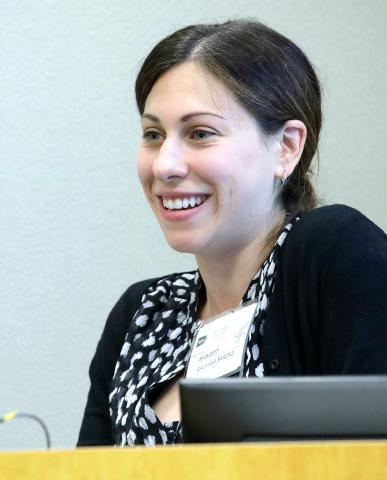Going Viral
Pediatrician Discusses Ethics Of Parents’ Online Posts

Photo: Ernie Branson
Many parents are quick to post photos of their kids on social media or blog about their child’s health. Parents have learned a thing or two from this practice—from foods to entice picky toddlers to favorite remedies for rashes and other common ailments—and often turn to online communities to share their experiences and network with other families.
On one hand, blogging and posting on such sites as Facebook and Twitter raise questions of privacy and other concerns unique to the pediatric population. But posting such information often provides social and emotional support; this is particularly salient for parents of children with complex or critical illness.
“Since we know social support for parents with generally healthy children is important, it actually may be critical for parents of children with complex or life-limiting illness, particularly when a diagnosis requires daily care and monitoring,” said Dr. Silvana Barone, a pediatrician recently transplanted from Montreal who is currently a clinical fellow in pediatric hospice and palliative medicine at Johns Hopkins Hospital and a postdoctoral fellow at Johns Hopkins Berman Institute of Bioethics. She spoke at a recent NIH bioethics group discussion in Bldg. 50.
Barone specializes in caring for children with medical complexity. These chronically critically ill children face an uncertain prognosis and typically have prolonged, recurrent stays in intensive care.
During her residency, while caring for children in the neonatal and pediatric ICUs, Barone noticed parents documenting their children’s health care journey online. That raised a multitude of questions including whether providers should engage online with families of patients.
“How can we, as providers, and should we, facilitate communication with these families for help with longitudinal decision-making, particularly for cases where outcomes are not so clear cut and there’s a lot of uncertainty?” Barone asked.
As technology evolves, so do guidelines for social media interactions in the medical community. “[The internet] changes the way we interact with our patients, for better or worse,” said Barone, and parents happen to be large consumers of social media.
But what happens when social media posts have the potential to compromise care?
Take the case of baby K, whose parents started blogging daily about her progress in the NICU. One of the nurses read the blog and was disheartened to see her competency questioned in such a public forum, especially since the parents never raised any concerns privately about her care. While the parents never named the nurse, the blog contained enough information to deduce her identity. The nurse, denied a transfer, nervously continued caring for the baby.
This is a clear case of a provider’s moral distress, said Barone, in which a professional cannot perform optimally due to institutional or other constraints.

Photo: Ernie Branson
“There’s good data to suggest that moral distress among providers can lead to burnout, can impact quality of care and has been found to be a contributing factor to nurses and other providers leaving their profession.”
Should medical staff even read patient blogs? Some say they can learn about patients and provide better care, said Barone. Others suggest maybe it’s wise to notify families before following them online. Some professional organizations encourage providers to use social media as an advocacy tool, but the Federation of State Medical Boards issued guidelines discouraging professionals from interacting with current or past patients on social media sites.
Baby K’s case also raises questions of privacy. “As providers, we have an obligation to maintain patient privacy and confidentiality,” said Barone. “But there’s no reciprocal obligation for members of the public.”
Parents who post about their kids on social media are free to praise or criticize medical staff and know they’re foregoing their privacy in the process.
“In pediatric cases, there’s an additional complexity to this issue of privacy,” said Barone, “because parents who choose to go public are no longer only foregoing their own privacy, but that of their child as well.” And these children, particularly those with chronic illness and not old enough to consent as subjects, now unwittingly have a very personal online footprint.
In another case, the parents of a young cancer patient launched an online petition requesting access to an experimental drug. The petition had 60,000 signatures in 2 days along with a media buzz that sent the hospital’s staff, PR and ethics departments into a frenzy. The oncologists were already willing to treat the child with this drug before the petition circulated.
The ethical issues raised by social media aren’t new. “Professionals work to maintain patient privacy, to maintain appropriate therapeutic boundaries, to help patients and families make difficult decisions and to treat all patients fairly,” said Barone. “What’s changed is the speed with which complex issues can be publicized.”
The fact that social media posts can easily go viral means it’s just as easy for misinformation and hoaxes to spread quickly. Barone said physicians might have a responsibility to have a voice in this and set the record straight.
“I think there is a role for social media in modern health care delivery,” said Barone. “I think we need to remain relevant to those we seek to serve.”
